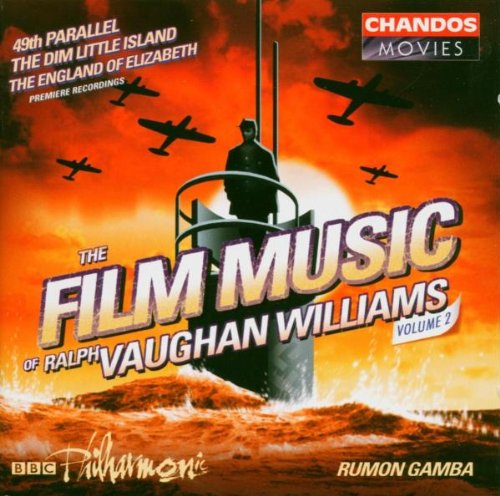Vaughan Williams Film Music, Volume 2
Terrific big-screen VW vividly championed by Gamba and company
View record and artist detailsRecord and Artist Details
Composer or Director: Ralph Vaughan Williams
Genre:
Orchestral
Label: Chandos
Magazine Review Date: 11/2004
Media Format: CD or Download
Media Runtime: 71
Mastering:
Stereo
DDD
Catalogue Number: CHAN10244

Tracks:
| Composition | Artist Credit |
|---|---|
| 49th Parallel |
Ralph Vaughan Williams, Composer
BBC Philharmonic Orchestra Emily Gray, Soprano Ralph Vaughan Williams, Composer Rumon Gamba, Conductor |
| (The) England of Elizabeth |
Ralph Vaughan Williams, Composer
BBC Philharmonic Orchestra Chetham 's Chamber Choir Ralph Vaughan Williams, Composer Rumon Gamba, Conductor |
| Dim Little Island |
Ralph Vaughan Williams, Composer
BBC Philharmonic Orchestra Martin Hindmarsh, Tenor Ralph Vaughan Williams, Composer Rumon Gamba, Conductor |
Author: Andrew Achenbach
Directed by Michael Powell and written by Emeric Pressburger and Rodney Ackland, 49th Parallel (1941) was the Ministry of Information’s only feature film, its plot of five stranded Nazi U-boat crewmen journeying through Canada to the haven of the then neutral United States – designed, in Powell’s words, ‘to scare the pants off the Americans and bring them into the war’. Vaughan Williams’s film score was the first of 11 he wrote between 1941 and 1958.
It was a challenge which evidently stoked his imagination, for inspiration runs high throughout this 39-minute sequence fashioned by Stephen Hogger. The unforgettable, nobly flowing ‘Prelude’ accompanies both the opening and closing titles, and enthusiasts will enjoy spotting thematic and stylistic links with masterworks to come (including Symphonies Nos 5-7 and Second String Quartet).
The present suite from The England of Elizabeth (written in the autumn of 1955 for a British Transport Commission documentary) adds eight minutes to Mathieson’s three-movement adaptation (familiar to many from Previn’s 1968 LSO account). It is, as annotator Michael Kennedy observes, a splendidly vital and inventive achievement. In the section depicting Tintern (track 18, from 6'45") Vaughan Williams quotes a theme from his unpublished tone-poem of 1906, The Solent (the tune also crops up in his first and last symphonies), and it’s soon followed by a haunting passage for choir alone.
Sandwiched between these two is a partial reconstruction of VW’s amiable 1949 score for The Dim Little Island, a 10-minute short commissioned by the Central Office of Information (which also featured the composer in the role of narrator). It borrows heavily from VW’s own Five Variants of Dives and Lazarus and even incorporates a verse of that selfsame melody sung by a solo tenor.
Rumon Gamba draws a polished and wholehearted response from all involved (the BBC Philharmonic is in fine fettle at the moment). The Chandos recording has striking body and lustre; exemplary presentation, too. Very strongly recommended.
It was a challenge which evidently stoked his imagination, for inspiration runs high throughout this 39-minute sequence fashioned by Stephen Hogger. The unforgettable, nobly flowing ‘Prelude’ accompanies both the opening and closing titles, and enthusiasts will enjoy spotting thematic and stylistic links with masterworks to come (including Symphonies Nos 5-7 and Second String Quartet).
The present suite from The England of Elizabeth (written in the autumn of 1955 for a British Transport Commission documentary) adds eight minutes to Mathieson’s three-movement adaptation (familiar to many from Previn’s 1968 LSO account). It is, as annotator Michael Kennedy observes, a splendidly vital and inventive achievement. In the section depicting Tintern (track 18, from 6'45") Vaughan Williams quotes a theme from his unpublished tone-poem of 1906, The Solent (the tune also crops up in his first and last symphonies), and it’s soon followed by a haunting passage for choir alone.
Sandwiched between these two is a partial reconstruction of VW’s amiable 1949 score for The Dim Little Island, a 10-minute short commissioned by the Central Office of Information (which also featured the composer in the role of narrator). It borrows heavily from VW’s own Five Variants of Dives and Lazarus and even incorporates a verse of that selfsame melody sung by a solo tenor.
Rumon Gamba draws a polished and wholehearted response from all involved (the BBC Philharmonic is in fine fettle at the moment). The Chandos recording has striking body and lustre; exemplary presentation, too. Very strongly recommended.
Discover the world's largest classical music catalogue with Presto Music.

Gramophone Digital Club
- Digital Edition
- Digital Archive
- Reviews Database
- Full website access
From £8.75 / month
Subscribe
Gramophone Full Club
- Print Edition
- Digital Edition
- Digital Archive
- Reviews Database
- Full website access
From £11.00 / month
Subscribe
If you are a library, university or other organisation that would be interested in an institutional subscription to Gramophone please click here for further information.




